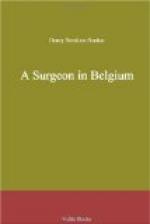In all previous wars between civilized nations a certain regard has been paid to the safety of the civilian population, and especially of the women and children. But from the very first the German policy has been to utterly ignore the rights of non-combatants, tearing up the conventions which they themselves had signed for their protection. No Government could be expected to be prepared for such a total apostasy from the elementary principles of civilized society, or to anticipate methods at which a Zulu might blush. If they had done so, it should have been their first care to remove all non-combatants from the area of fighting, and to make provision for them elsewhere. It is unfair that a civilian should be left with the hopeless choice of leaving a child in a house where it may at any moment be killed by a shell or taking it away with a considerable probability that it will be a homeless orphan. For life is a matter of small moment; it is living that matters.
The problem of the children of Belgium will be one of the most serious to be faced when the war is over. There will be a great number of orphans, whilst many more will be simply lost. They must not be adopted in England, for to them Belgium will look for her future population. There could be few finer ways in which we could show our gratitude to the people of Belgium than by establishing colonies over there where they could be brought up in their own country, to be its future citizens. It would form a bond between the two countries such as no treaty could ever establish, and Belgium would never forget the country which had been the foster-mother of her children.
But Ypres gave us yet another example of German methods of war. On the western side of the town, some distance from the farthest houses, stood the Asylum. It was a fine building arranged in several wings, and at present it was being used for the accommodation of a few wounded, mostly women and children, and several old people of the workhouse infirmary type. It made a magnificent hospital, and as it was far away from the town and was not used for any but the purposes of a hospital, we considered that it was safe enough, and that it would be a pity to disturb the poor old people collected there. We might have known better. The very next night the Germans shelled it to pieces, and all those unfortunate creatures had to be removed in a hurry. There is a senseless barbarity about such an act which could only appeal to a Prussian.
XXIV. Some Conclusions
To draw conclusions from a limited experience is a difficult matter, and the attempt holds many pitfalls for the unwary. Yet every experience must leave on the mind of any thinking man certain impressions, and the sum of these only he himself can give. To others he can give but blurred images of all he may have seen, distorted in the curving mirrors of his mind, but from these they can at least form some estimate of the truth of the conclusions he ventures to draw. For myself, these conclusions seem to fall naturally into three separate groups, for I have met the experiences of the past three months in three separate ways—as a surgeon, as a Briton, and as, I hope, a civilized man. It is from these three aspects that I shall try to sum up what I have seen.




